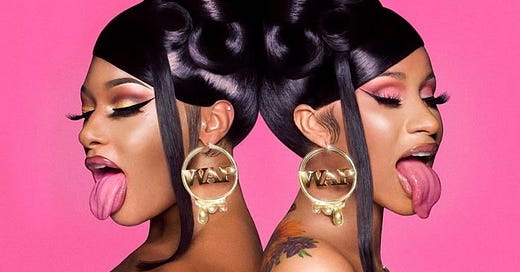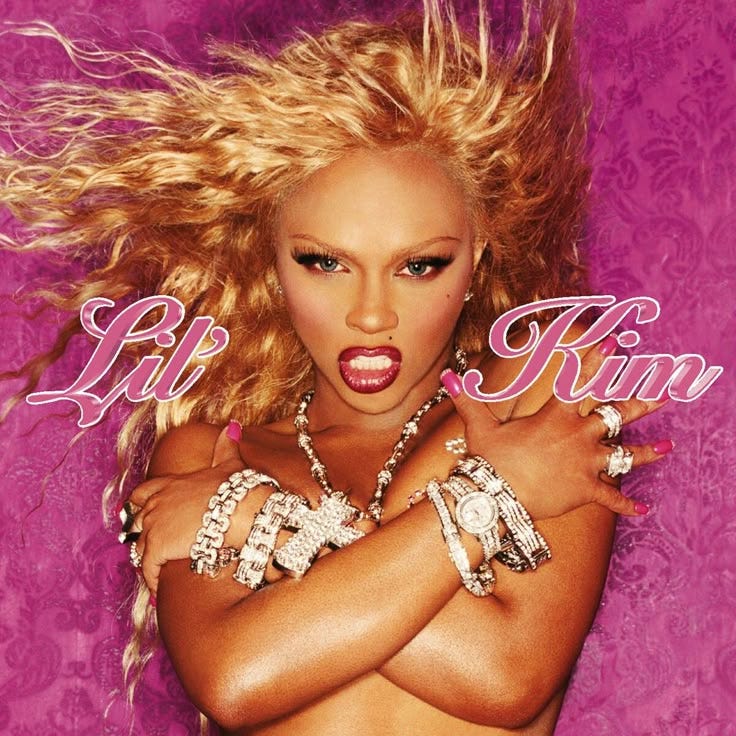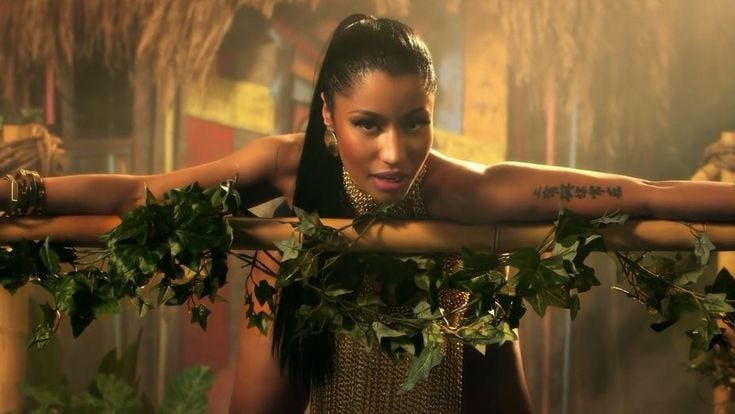Black Woman Rappers: Young Gen is sexually free
This is part two of the Black Woman Rappers: Historical progression from streetwear to sexy essay. Enjoy ;))
Pinterest User miss r
Around the late 1990s to early 2000s, a new era of Black female rappers began to appear. Salt-N-Pepa laid the foundation for Black female rappers to talk about their sexuality, but in the late 90s and early 2000s, Lil Kim was the pioneer of Black female sexual liberation, especially rappers. Unlike Black female rappers in the 80s and 90s, Lil Kim embraced her body and femininity. Her album covers and award show outfits were revealing, colorful, and sexy. In her music, she didn’t shy away from explaining her sexual desire in explicit detail. Lil Kim got her rise to fame, by being a part of the record label, Bad Boys, and having the support of Biggie. However, Lil Kim was the only female rapper on the Bad Boys label. Since she was surrounded by men, critics thought her raunchy personality and lyrics were trying to appease the male gaze. Black feminists disapproved of Lil Kim’s sexual freedom because she was seen as feeding into the harmful stereotypes of Black women’s sexualization. The main stereotype, the Jezebel, is a stereotype used to paint Black women as sexual villains, using their bodies to control men.
Lil Kim went against the motivations of the older generation Black female rappers, by calling women “bitches” and having an individualistic perspective in her music. Critics believed Lil Kim's emphasis on sexuality was only for profit and shock value. However Lil Kim, “recognizes that sex is more than just about desire and pleasure. It is about power. She is essentially a “female king,” dominating the genre of hip-hop on her own terms, questioning the misogynistic status quo…In her world, a woman can say the words “hymen”, “uterus” and “pap smear” outside of the gynecologist’s office without feeling ashamed or embarrassed.”1 By using the biological terms for a woman’s body with confidence and not shying away from sex, Lil Kim worked to destigmatize the sexuality of Black women. She fought against the respectability politics limiting the former Black female rappers, thus leading to the new generation of sexuality and rap.
Lil Kim’s influence inspired the 2010s present-day Black female rappers to explore their sexuality and individual desires in music. From Nicki Minaj’s Anaconda to Megan thee Stallion and Cardi B's WAP. Black female rappers have taken away the respectability politics surrounding women in rap and created a lane for themselves. Even though critics continue to look down upon Black women’s sexuality, the mainstream audience is embracing the era of sexual liberation. The older generation fought against the objectification and stereotypes placed on them because of their gender and race. However, the younger generation doesn’t allow the audience and critical opinion to change their artistic expression. As individuals, they stand up for their vision and talent.
Pinterest User Alba García
In “Ancadona” Minaj dedicated the song to talking about her butt, however “she does so to make a mockery of images making her appear as socially deviant and hypersexual. By displaying her butt so directly, she is showing that her body cannot be controlled or used and that she is in control.”2 When “Anaconda” was released, Minaj was addressing the media’s conversation about her body, specifically her butt, and whether or not it was real. She chose to record Anaconda as a way of embracing and mocking the media, instead of running away from the attention. She turned the objectification of her body into a celebration of feminine sexuality. Before the masculine nature of hip-hop could change the narrative of the song, Minaj ended the video with her grinding on Drake, a popular rapper. In hip-hop, Black women's bodies are seen as decorations and additions to a male rapper's masculinity. Minaj, featuring Drake in the “Anaconda” video, turned the objectification onto the men. Drake has no personality, his body is the main focus, as Minaj displays her power over him. He’s seen as an addition to her sexual nature and ability to hypnotize men with her body. Minaj turned male rappers' idea of women as an accessory to their masculinity, into the ability to control masculinity as an enhancement of femininity. Femininity is put in a position of power over male rappers.
Pinterest User Asami
A similar change in gender performance took place in Cadi B and Megan thee Stallion's song, WAP. In the song, Cardi and Magan thee Stallion used a popular beat and lyrical imagery to explicitly describe how their genitalia was the best. Throughout the song, they celebrate their sexuality and the joy of having sex as a woman. They deconstructed the notion of sex, revolving around the man’s pleasure and putting focus on the women. “Together, Cardi B and Megan Thee Stallion adopt the vulgarity that men within the hip-hop genre have perpetuated for years, using it positively as a means to empower all women.”3 WAP received hate and criticism from the media because men are forced to encounter the sexual desires of Black women. These desires were seen as a domestic sphere topic, only for Black women to convey with their husbands in a private space. In the domestic sphere for a Black couple, respectability politics dictate the notion of sex for women and men. Black women were expected to focus on the Black man’s pleasure and put themselves as an afterthought. Black male rappers are used to women boosting their sexuality to attract them and add to their sense of manliness. The backlash of WAP derived from Cardi B and Megan Thee Stallion focusing on themselves, leaving the man as an afterthought. Similar to Anaconda they are putting men into an objectification role. The man is only mentioned as a way to please their desires and sexual needs. With songs such as “Anaconda” and “WAP,” the young generation of Black female rappers have expanded on the beginning of women in hip hop. They have created a culture, where Black women can celebrate their individual sexual needs, fantasies, and power roles. Black female rappers such as Lil Kim, Nicki Minaj, Cardi B, and Megan Thee Stallion, have taken away respectability politics from hip-hop and encouraged women's empowerment through sexual liberation.
The young generation of Black female rappers are talking about a stigmatized topic, such as sex, that the older generation had to censor themselves around, even though these are individual artistic choices, there was a societal shift that created space for these artists to express their sexuality. During the 80s and 90’s Black female rappers lived in a society, where Black women were finding their place in the fight for equality. Before the 80s and 90s, Black women were grouped with Black men, during the civil rights era. Black women wanted to call out their intersectionality obstacles, but couldn’t correlate where they could express their struggles; the feminist movement failed to recognize their race and Civil rights ignored their womanhood. Back then “the words feminist and feminism were seen as derogatory, or more so, a badge of dishonor to most black women. Older generations of black women were accustomed to feminist discourse dominated by white women, whereas the younger generation could not grasp the rigid either-or-model that was associated with feminism.”4
Keep reading with a 7-day free trial
Subscribe to BritDaFairy’s Substack to keep reading this post and get 7 days of free access to the full post archives.






